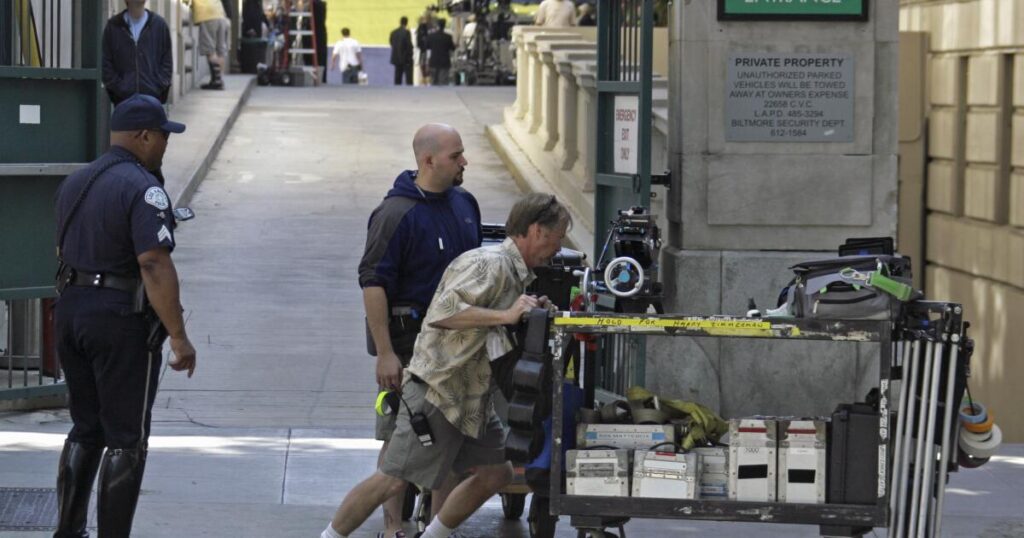So-called Hollywood ambassadors Jon Voight and Sylvester Stallone joined with a coalition of entertainment industry groups for a letter delivered this week to President Trump urging him to support tax measures and a federal tax incentive that would help bring film and TV production back to the U.S.
The letter is signed by Voight, Stallone, all the major Hollywood unions and trade groups such as the Motion Picture Assn., the Producers Guild of America and the Independent Film & Television Alliance, indicating widespread support from the entertainment industry.
“Returning more production to the United States will require a national approach and broad-based policy solutions … as well as longer term initiatives such as implementing a federal film and television tax incentive,” the letter states.
In the letter, which was obtained by The Times, the groups say they support Trump’s proposal to create a new 15% corporate tax rate for domestic manufacturing activities that would use a provision from the old Section 199 of the federal tax code as a model.
Under the previous Section 199, which expired in 2017, film and TV productions that were made in the U.S. qualified as domestic manufacturing and were eligible for that tax deduction, the letter states.
The letter also asks Trump to extend Section 181 of the federal tax code and increase the caps on tax-deductible qualified film and TV production expenditures, as well as reinstating the ability to carry back losses, which the groups say would give production companies more financial stability.
The tax measures — particularly Sections 199 and 181 — are issues the entertainment industry has long advocated for, according to two people familiar with the matter who were not authorized to comment publicly. The letter itself came together over the weekend, they said. It was intended to present different measures that shared the same goal of increasing domestic production, one person said.
For the record:
3:09 p.m. May 12, 2025A previous version of this story stated Susan Sprung’s title as executive director. She is chief executive of the Producers Guild of America.
“Everything we can do to help producers mange their budgets is important,” said Susan Sprung, chief executive of the Producers Guild of America. “In an ideal world, we’d want a federal tax incentive, in addition to these tax provisions, but we want to advocate to make it as easy as possible to produce in the United States and make it as cost-effective as possible.”
Last week, Trump threw the entertainment industry into chaos after initially suggesting a 100% tariff on films made in other countries. Then, California Gov. Gavin Newsom jumped into the mix, calling for a $7.5-billion federal tax incentive to keep more productions in the U.S.
The proposals on the federal level come as states are upping their own film and TV tax credits to better compete against each other and other countries. Late last week, New York Gov. Kathy Hochul signed the state’s budget, which increased the cap for its film tax credit to $800 million a year, up from $700 million.
The expanded tax incentive program allocates $100 million for independent studios and gives additional incentives to companies that produce two or more projects in New York and commit to at least $100 million in qualified spending.
The program was also extended through 2036, which could help attract TV producers, who often want to know that their filming location is committed if they’re embarking on a series.
Production in New York has been slow, and the state needed this boost, said Michael Hackman, chief executive of Hackman Capital Partners, which owns two film and TV studio properties in the state, as well as several facilities in California. The increase from New York could also push California to increase its own film and TV tax credit program.
Last year, Newsom called to increase the annual amount allocated to California‘s film and TV tax credit program from $330 million to $750 million.
Two bills are currently going through the state legislature that would expand California’s incentive, including increasing the tax credit to cover up to 35% of qualified expenditures (or 40% in areas outside the Greater Los Angeles region), as well as expanding the types of productions that would be eligible for an incentive.
“We have the best infrastructure, the best talent, we have everything going for us,” Hackman said. “So if our state legislature can get more competitive with our tax credits, I think more productions will stay. But if they don’t, this will result in more productions continuing to leave the state and going to New York and to other locations.”
